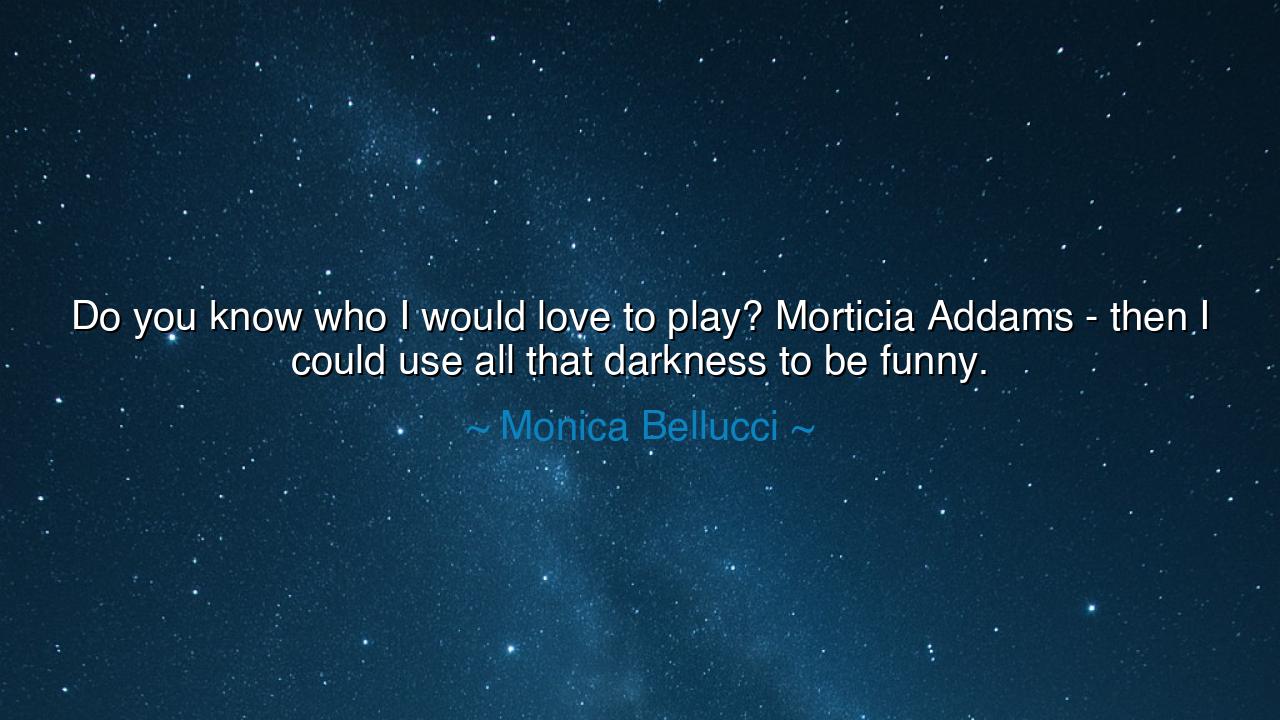
Do you know who I would love to play? Morticia Addams - then I
Do you know who I would love to play? Morticia Addams - then I could use all that darkness to be funny.






When Monica Bellucci said, “Do you know who I would love to play? Morticia Addams — then I could use all that darkness to be funny,” she was not merely expressing admiration for a fictional character; she was revealing a timeless truth about the alchemy of opposites — that even the darkness within us, when embraced with grace and awareness, can become a source of light and laughter. In her words, there is the echo of an ancient wisdom: that shadow, when understood, is not destruction but depth, and that humor, born from the abyss, is one of humanity’s noblest forms of transcendence.
The origin of this reflection lies in Bellucci’s lifelong fascination with roles of power, mystery, and sensuality. Known for her poise and gravity, she has often embodied the archetype of the dark muse — the woman who carries silence like a crown and passion like a secret flame. In choosing Morticia Addams, the matriarch of the Addams family, she identifies not with despair, but with the playful dignity of darkness. Morticia is no villain; she is elegance personified, a goddess of shadow who turns morbidity into wit and melancholy into style. Bellucci’s wish to “use all that darkness to be funny” is thus a wish to reclaim power from sorrow, to transform solemnity into delight — as all great artists and philosophers have done.
The ancients understood this sacred transformation well. The philosopher Heraclitus wrote that “the road up and the road down are one and the same,” meaning that the descent into shadow and the ascent into joy are not separate journeys, but two directions of the same path. Likewise, in Bellucci’s vision, the darkness that life bestows — the pain, the loss, the gravity of existence — can be reimagined, even redeemed, through humor and beauty. To be funny through darkness is not to mock it, but to master it, to wear it as a garment of wisdom rather than a chain of grief. It is the laughter of one who has walked through the night and returned, not untouched, but transformed.
We see this truth reflected through the ages. Consider Euripides, whose tragic plays often revealed flashes of irony amidst suffering, or Dante Alighieri, who journeyed through Hell not to drown in despair, but to emerge wiser. Even the medieval fools, those jesters draped in bells and folly, were wise enough to tell kings the truths others feared to speak. Like Morticia, they wielded humor as a blade of insight — cutting through the heaviness of life with a smile. Bellucci’s desire to play Morticia is, in spirit, a desire to join this lineage: to embody the ancient art of laughing from within the shadows, to show that beauty and darkness, when united, can become something divine.
In the figure of Morticia Addams, we find a profound archetype — the Dark Mother, the keeper of mystery, who finds mirth in mortality and grace in decay. She waters her roses but cuts off the blooms, preferring the thorns; she lives in a world of death, yet her laughter is full of life. Bellucci, in her words, recognizes that this kind of darkness is not evil — it is truth without illusion, the awareness that all things fade, and that even fading can be exquisite. To make that darkness “funny” is to reconcile ourselves with impermanence, to look at the inevitable and smile.
Such wisdom is not confined to fiction. The great artist Frida Kahlo, painting her pain in vivid colors, turned tragedy into beauty. The writer Oscar Wilde, imprisoned for his truth, still found wit in suffering. And Monica Bellucci, through her longing to inhabit Morticia, stands among these figures — those who understood that humor born from darkness is the highest form of resilience. It says to the universe, “You cannot destroy me; I have already turned your shadows into art.”
So, my listener, let this be your lesson: do not fear your darkness. Do not hide the parts of yourself that seem heavy, strange, or sorrowful. Like Morticia — like Bellucci — learn to weave them into elegance and laughter. Light alone cannot sustain the soul; it is the balance between shadow and flame that creates wholeness. If pain finds you, learn to transform it; if sorrow lingers, give it music, or paint it with irony. For to use one’s darkness to be funny — to make others smile from within one’s own shadow — is not only courage, it is wisdom in its most radiant form.
And thus, Bellucci’s simple desire becomes a timeless teaching: that darkness need not destroy, that it can illuminate, entertain, even heal. The truest artist is not the one who escapes shadow, but the one who dances in it — gracefully, knowingly, and with laughter that echoes through eternity.






AAdministratorAdministrator
Welcome, honored guests. Please leave a comment, we will respond soon